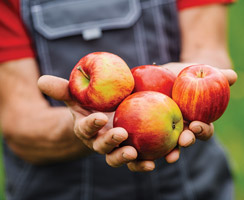Re-energize Your ‘Base’ With Field Trips
March 1, 2019 | 3 min to read
The article emphasizes the critical need for produce executives to leave their offices and visit vendors in the field. These trips, although challenging to coordinate, provide invaluable insights into how products are grown, harvested, and delivered, which enhances operational understanding and strengthens vendor relationships. By actively engaging with suppliers, executives gain essential knowledge that improves both their operations and consumer experiences. Ultimately, this hands-on approach may lead to a successful and financially rewarding produce operation.

Originally printed in the March 2019 issue of Produce Business.
 Periodically the experienced produce executive has to get out of his office and into the growing fields to see what’s new in the industry. It is always difficult to leave the nerve center of the operation, but it is a vital and necessary step that must be taken.
Periodically the experienced produce executive has to get out of his office and into the growing fields to see what’s new in the industry. It is always difficult to leave the nerve center of the operation, but it is a vital and necessary step that must be taken.
Although getting permission for such trips may not be the easiest thing to obtain, you must secure approval from your boss. Since most upper managers come from the grocery side or other departments of the store, they are not familiar with why such a trip could reap big benefits.
Management often has trouble understanding why it is necessary to go out and observe the product being harvested and packed in the field by your suppliers, as most of the suppliers they have dealt with are large-scale corporations and food companies. These companies are not subject to the many challenges often presented to the produce operation. This lack of understanding might prompt them to resist and periodically turn down your request to go out into the field. But this reluctance only shows that once again, “they just don’t get it.”
The importance of getting out of your office and taking the time to visit your vendors cannot be overstated. The knowledge gained from these types of visits is invaluable as it shows how your products are grown, picked, packed and delivered to your operation. These vendors form your ‘base’ of supply and are absolutely irreplaceable for the successful produce retailer. Although it is much easier and less expensive to visit and get to know your local vendors, it is equally as important to understand the challenges of other vendors throughout the country. In order to do this, you will have to plan for such visits. First, you have to accept any of the many invitations you receive from various vendors and then plan itineraries that provide the maximum insight on how your vendors operate.
By understanding how they operate and the challenges they face, you can strategically align your business and prepare strategies that enhance the produce operation but also complement the operations of your vendors. By knowing how they grow, harvest, pack and ship, you gain an understanding of how to treat the products as well as protect them throughout your operation. In addition, these visits can yield valuable business intelligence, such as how vendors protect the product so they can deliver it to you in the best possible condition. It also allows you to understand the vendors’ food safety processes and what they are doing at every step in the operational sequence. This onsite meeting will provide you with a wealth of firsthand knowledge about the vendor’s total operation, which could prove invaluable during a crisis. But, most importantly, in addition to knowledge, you form strong, personal alliances with the vendors that you depend on.
The importance of getting out of your office and taking the time to visit your vendors cannot be overstated. The knowledge gained from these types of visits is invaluable as it shows how your products are grown, picked, packed and delivered to your operation.
Once you have completed the trip, you can share what you learned throughout the ranks of your operation. Every bit of information you gather can be shared in communications to your individual store operations. It provides them with knowledge they can use to answer questions from consumers. It helps store-level employees perform their tasks with better knowledge of why they are performing these jobs.
 As time goes by, you can allow other members of your team to take trips on their own and establish direct relationships with their vendors. This action adds another level of training and expertise to each member of the team and strengthens your overall operation by developing insightful, capable personnel.
As time goes by, you can allow other members of your team to take trips on their own and establish direct relationships with their vendors. This action adds another level of training and expertise to each member of the team and strengthens your overall operation by developing insightful, capable personnel.
The key to successful trips and gaining as much valuable information as possible from each and every foray into the field is to LISTEN. These trips must be approached as a complete educational experience and a valuable learning tool. Your vendors are experts in their field and have much to share about their operation and what they are trying to accomplish. By fully understanding their operation you can understand and cooperate with vendors, to advance both of your businesses.
Be sure to work into your schedule as many of these trips as possible and apply everything you learn to improve the experience for consumers. Despite management’s concerns about the cost and time away from the office, visiting your ‘base’ will yield dividends and a more thorough understanding of your entire supply chain. This activity will result in a first-class produce operation and more than likely, financial success.
Don Harris is a 41-year veteran of the produce industry, with most of that time spent in retail. He worked in every aspect of the industry, from “field-to-fork” in both the conventional and organic arenas. Harris is presently consulting. Comments can be directed to [email protected].
10 of 23 article in Produce Business March 2019

